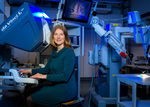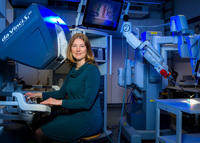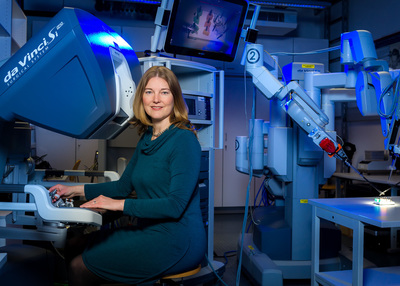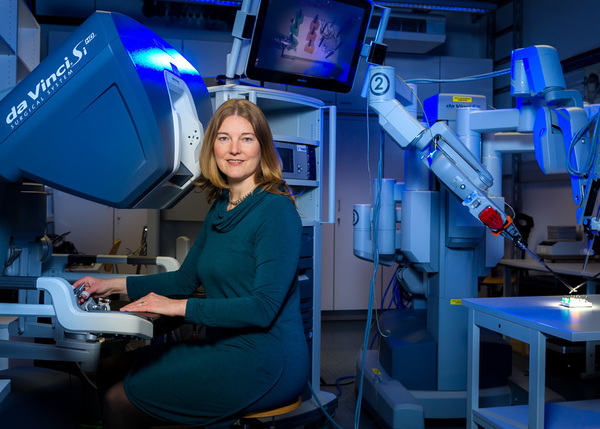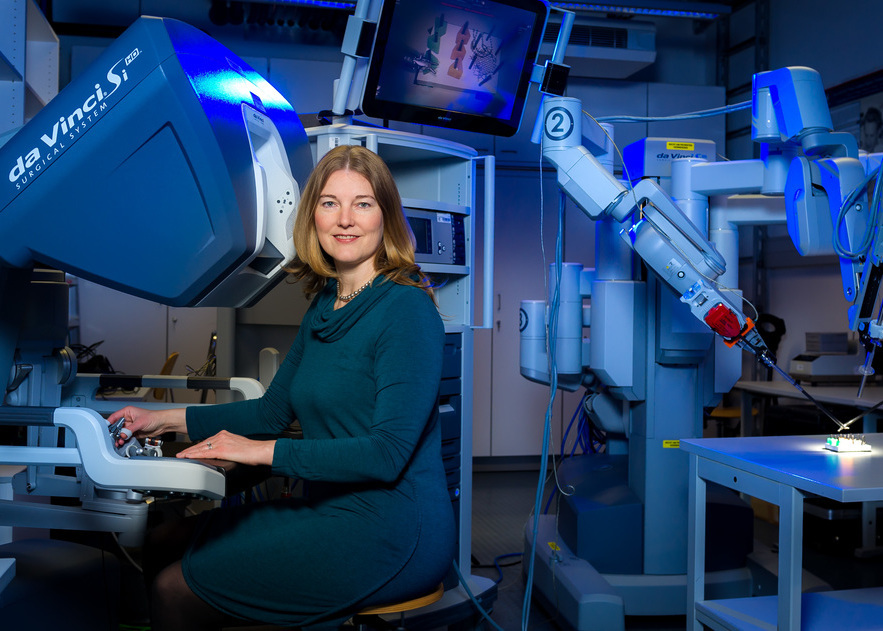Katherine J. Kuchenbecker, Director of the Haptic Intelligence Department at the Max Planck Institute for Intelligent Systems
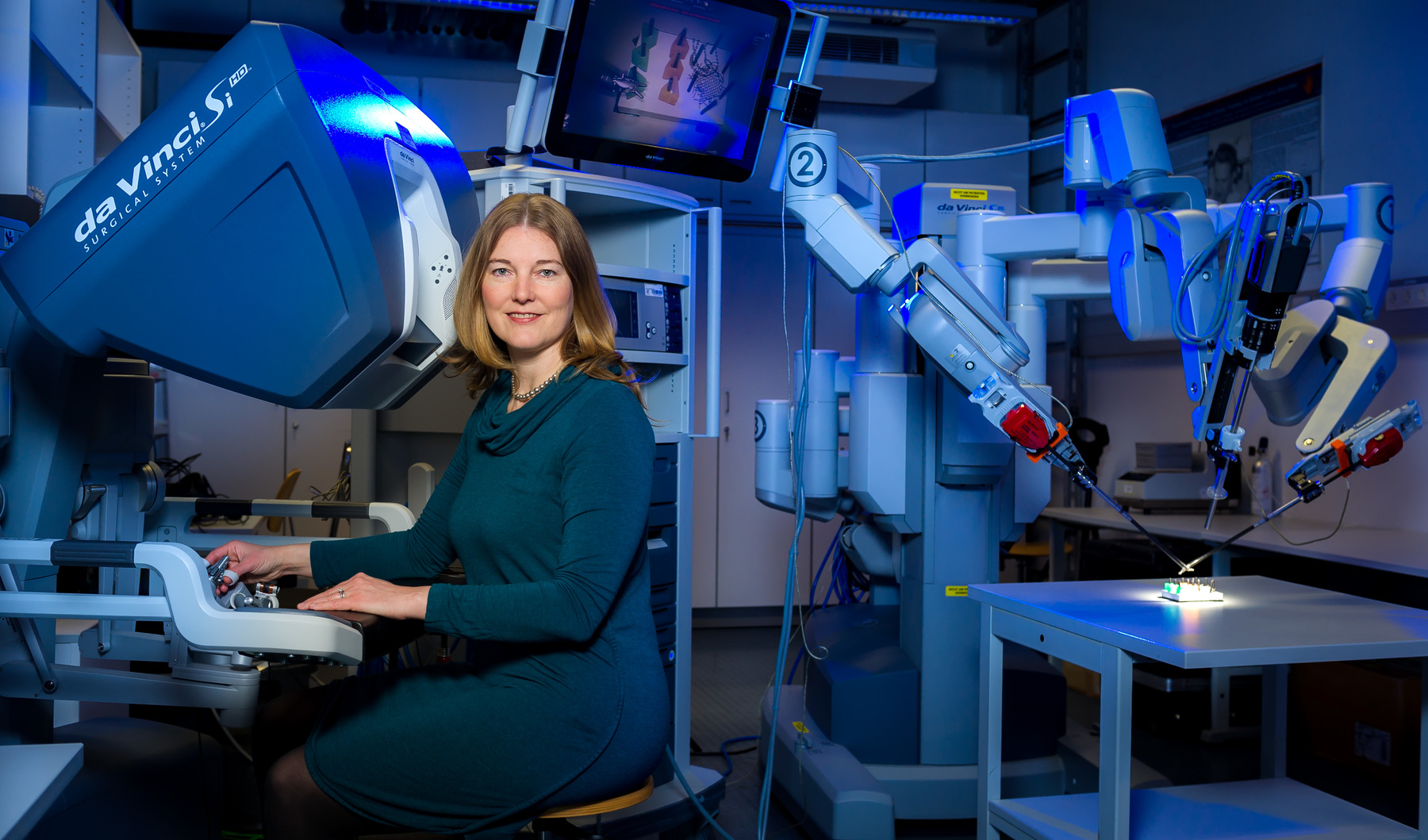
Computer fordern Augen und Ohren, doch alle anderen Sinne liegen brach. Wo bleibt der Tastsinn? Doch lässt sich das Gefühl in den Fingerspitzen künstlich so gut nachbilden, dass sich die virtuelle Kopie so anfühlt wie das Original und damit zu einer tatsächlichen virtuellen Realität wird? Diese Fragen beschäftigen Dr. Katherine J. Kuchenbecker seit Beginn ihrer Forscherkarriere. Sie ist Direktorin der Abteilung für Haptische Intelligenz sowie geschäftsführende Direktorin des Stuttgarter Standorts des Max-Planck-Instituts für Intelligente Systeme. Der Tastsinn von Robotersystemen ist ihr Spezialgebite. Forscher wie sie machen die digitale, die virtuelle Welt fühlbar. Bei der Interaktion mit Computern steht das Sehen und Hören im Vordergrund. Aber etwas Wichtiges fehlt: die Haptik. Ein zentrales menschliches Bedürfnis wird vernachlässigt: das nach Sinneseindrücken jenseits von Sehen und Hören. Wie soll man eine virtuelle Welt begreifen können, wenn man sie nicht greifen kann? Die Technik hat sich bisher genau ins Gegenteil entwickelt. Sie entzieht den Fingerspitzen das Gefühl. Doch das ändert sich immer mehr, ist Kuchenbecker überzeugt. Haptik wird in der virtuellen Welt eine immer wichtige Rolle spielen. Die Grundlagenforschung ihres Teams trägt einen wesentlichen Teil dazu bei, die digitale Welt aus Bild und Ton um Fingerspitzengefühl zu erweitern. Dr. Katherine J. Kuchenbecker promovierte im Jahr 2006 an der Fakultät für Maschinenbau der Stanford University in Kalifornien in den USA. Nach ihrer Post-Doc Zeit an der Johns Hopkins University in Baltimore, USA, nahm sie eine Juniorprofessur am Institut für Maschinenbau und Angewandte Mechanik an der Universität Pennsylvania in Philadelphia, USA, an. 2013 wurde sie zur Assistenzprofessorin befördert. Seit Januar 2017 ist sie Direktorin am Max-Planck-Instituts für Intelligente Systeme und leitet dort die Abteilung für Haptische Intelligenz. Sie kombiniert in ihrer Forschung Inspirationen aus den Neurowissenschaften mit Kenntnissen aus den Bereichen Materialwissenschaft, Maschinelles Lernen und Robotik, um die zugrundeliegenden Prinzipien der haptischen Wahrnehmung aufzudecken. Das Bild zeigt Kuchenbecker neben einem Intuitive da Vinci Si, einem robotergestützten Operationssystem, mit dem ein/e Chirurg*in einen Patienten aus der Ferne operieren kann. Normalerweise führt der Arzt oder die Ärztin die Operation nur aufgrund dessen durch, was er oder sie sieht. Kuchenbecker und ihr Team haben den Roboter so erweitert, dass Chirurg*innen die Vibrationen der chirurgischen Instrumente spüren und so ihr wertvolles Fingerspitzengefühl einsetzen können. Die Erkenntnisse aus Forschungsprojekten im Zusammenhang mit dem da Vinci werden in die Arbeit des Exzellenzclusters "Integrative Computational Design and Construction for Architecture (IntCDC)" der Universität Stuttgart einfließen und selbstlernenden Konstruktionsroboter mit haptischem Feedback versehen, damit sie spüren können, was sie tun. ******* Computers demand eyes and ears, but all other senses lie fallow. Where is the sense of touch? But can the feeling in the fingertips be artificially reproduced so well that the virtual copy feels like the original and thus becomes an actual virtual reality? Dr. Katherine J. Kuchenbecker has been preoccupied with these questions since the beginning of her research career. She is Director of the Haptic Intelligence Department and Managing Director of the Stuttgart site of the Max Planck Institute for Intelligent Systems. The tactile sense of robotic systems is her specialty. Researchers like her make the digital, the virtual world tangible. When interacting with computers, the focus is on seeing and hearing. But something important is missing: haptics. A central human need is neglected, that of tactile interaction. How can you understand a virtual world if you can't feel it? So far, technology has developed exactly the opposite. It deprives fingertips of feeling. But Kuchenbecker is convinced that this trend needs to change. Haptic feedback will play an increasingly important role in the virtual world. Her team's basic research plays a key role in expanding the digital world of sound and vision to include a sense of touch. Dr. Katherine J. Kuchenbecker received her doctorate in 2006 in Mechanical Engineering at Stanford University in California, USA. After her time as post-doc at Johns Hopkins University in Baltimore, USA, she accepted an Assistant Professor position in Mechanical Engineering and Applied Mechanics at the University of Pennsylvania in Philadelphia, USA. She was promoted to Associate Professor with tenure in 2013. Since January 2017, she has been a Director at the Max Planck Institute for Intelligent Systems, where she heads the Haptic Intelligence Department. Her research combines inspiration from neuroscience with mechanical engineering, computer science, machine learning and robotics to uncover the underlying principles of haptic interaction. The picture shows Kuchenbecker next to an Intuitive da Vinci Si, a robot-assisted surgical system with which a surgeon can operate on a patient from a distance. Normally, the physician conducts the operation based only on what he or she sees. Kuchenbecker and her team have augmented the robot in such a way that surgeons can feel the vibrations of the surgical instruments and thus employ their valuable fingertip sensitivity. The insights gained in research projects related to the da Vinci will be employed in the work of the “Integrative Computational Design and Construction for Architecture (IntCDC)“ Excellence Cluster of the University of Stuttgart, providing self-learning construction robots with haptic feedback, so they can feel what they are doing.
Ⓒ Universität Stuttgart/M. Kovalenko
Cropped Images (thumbnails)

